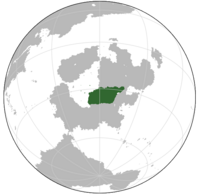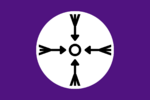Dilania
United Dilanian States | |
|---|---|
| Anthem: ᎩᏙᏂᎪᏗ ᎢᎦᎨᏒᎢ! Giyvquogid Igageyutsiga! | |
 | |
| Capital and largest city | Taligadu |
| Official languages | Dilanian |
| Recognised regional languages | Yawathan |
| Ethnic groups (2023) |
|
| Religion (2023) |
|
| Demonym(s) | Dilanian |
| Government | Federal presidential republic under an authoritarian dictatorship |
| Adahy Sequoyah | |
| Usdi Tsula | |
| Kanati Tsoy | |
| Legislature | Dilanian Assembly |
| Formation | |
| 810 | |
| 1470-1540 | |
| 2 May 1541 | |
| 9 April 1776 | |
| 15 March 1920 | |
| 2 September 1984 | |
| Area | |
• Total | 1,987,094 km2 (767,221 sq mi) |
| Population | |
• 2023 estimate | 89,500,000 |
• 2015 census | 89,491,032 |
• Density | 45.0/km2 (116.5/sq mi) |
| GDP (nominal) | 2023 estimate |
• Total | |
• Per capita | |
| Gini (2023) | very high |
| HDI (2022) | high |
| Currency | Dilanian Gadohi (₲) (DGA) |
| Date format | dd-mm-yyyy |
| Driving side | right |
| Calling code | +96 |
| ISO 3166 code | DI |
| Internet TLD | .di |
Dilana, officially the United Dilanian States, is a country in eastern Galia. It is bordered to the west by the Great Galian Sea, to the east by the Achrinian Ocean and Naossia, to the south by Alaoyi, and to the north by Onhsanenea and Yawatha. The country's climate is dry and arid, with predominant featuring of mild to cool, wet winters and hot, dry summers. This climate occurs mostly in the south of the country, including most major cities. The Uyuiga Desert dominates the northern half of the country, and is a hot desert. As a result, much of the country's population lives in the south or along the Nvdoitsovgisgi River. The capital and largest city is Taligadu, but other major cities include Chilhowee, Tellico, and Tallassee.
The vast majority of the population is of Dilanian descent, though signifigant minorities of Yawathan and Onhsaneneans populations exist. The only nationally recognized minority is the Yawathan population, which has its own autonomous zone, the Yawathan Autonomous Province, and government services are available in Yawathan. Most of the rest of the population is Onhsanenean. Non-Dilanians face signifigant obstacles in their professional and career lives, though Yawathans, Onhsaneneans, and other Eastern Galians are generally considered to face less discrimination and Nuwelanders are generally considered to face more.
The first protostate to arise out of what is now Dilania was the Dil, a nomadic warrior culture that covered much of southeastern Dilania and Naossia. While the Dil would collapse by about 1000 AD, its legacy remained as the optimal goal for other states in the region. The Dilani Empire would conquer much of what is modern Dilania and Onhsanenea in the 1400s and 1500s in a series of conquests. In 1776, a favorable marriage led to the addition of the Yawathan Kingdom into a duel monarchy known as the Dilanoyawathan Empire. Dilanoyawatha would split Nuweland with Alanna in the early 1800s in a series of partitions, but relations would sour by the end of the century as Greater Niagara, Alanna, and Dilanoyawatha would compete for dominance in the Galian region. This rivalry culminated in the First Great War, which Dilanoyawatha lost, resulting in the Revolution of 1920, which ended the empire and split it into the Yawathan National Republic, an independent Onhsanenea, and the Dilanian State, a destralist and totalitarian state. Despite victory in the Second Great War, the Dilanian State stagnated and was unprepared for the Third Great War. Mounting losses and the prospect of a two front war led to the collapse of the Statist government and the rise of a federal republic in 1984.
Despite free elections in 1984, 1992, 1996, and 2002, the country fell into totalitarianism. The presidencies of Edah Korelia and Adahy Sequoyah have been criticized for increasing human rights violations and authoritarian tendencies. In 2015, Korelia died of a heart attack and was replaced by his Chief of Staff, Adahy Sequoyah.
Dilania is an authoritarian state where political repression is common and unapologetic. It is a member of the Mutual Defense Pact and is a frequent supporter of Inglaterra on the global stage. Despite this, it is a member of the Global Community and maintaisn informal relations with the Galian Economic Conference, though it was ejected from the bloc for ongoing human rights violations. Dilania ranks low in international measurements of freedom of the press and civil liberties. It has continued a number of Statist-era policies, such as state ownership of large sections of the economy.
Politics
Main Article: Politics of Dilania
Government
Main Article: Government of Dilania
Dilania, by constitution, is a presidential federal republic with separation of powers, governed by a president and the Dilanian Assembly. However, Dilania has been led by a highly centralized and authoritarian government, and has often been described as a "new destralist state" and "totalitarian" by some media outlets, politicians and governments. Dilania has been considered an autocracy where power is ultimately concentrated in the hands of the president, elections are not free and judicial independence is weak. The Council of Galia removed Dilania from its membership status since 2005 as a response to election rigging in the 2005 legislative elections and constitutional referendum. Re-admission of the country into the council is dependent on the completion of benchmarks set by the council, including the improvement of human rights, rule of law, and democracy.

The term for each presidency is eight years years. In 1984, the term was six years and the president could serve for only a single term as president, but a change in the constitution in 2008 eliminated term limits and extended terms to eight years. In 2005, Korelia called for a controversial vote to extend the presidential term from six to eight years and to eliminate limits, and as a result the election meant for 2014 was pushed to 2016 Dilanian Presidential Election. The referendum on the extension was denounced as a "fantastic" fake by foreign observers, who called the referendum a "farce" that has "effectively murdered democracy" in Dilania. Sequoyah has been the president of Dilania since 2015, taking over after the death of Korelia.
The Dilanian Assembly is the sole house of the legislature, consisting of 150 members and has the power to approve political appointments, make constitutional amendments, call for a vote of confidence on some government officers, and make suggestions on foreign and domestic policy.
The government includes a Council of Dilania, headed by the chief of staff. The members of this council need not be members of the legislature and are appointed by the president. The judiciary comprises the Dilanian Supreme Court which consists of 31 judges who are randomly selected to either hear certain cases or to deal with specific issuess, such as those related to constitutional and business law. The judges of national courts are appointed by the president and confirmed by the Council of Dilania. For criminal cases, the highest court of appeal is the Supreme Court.


